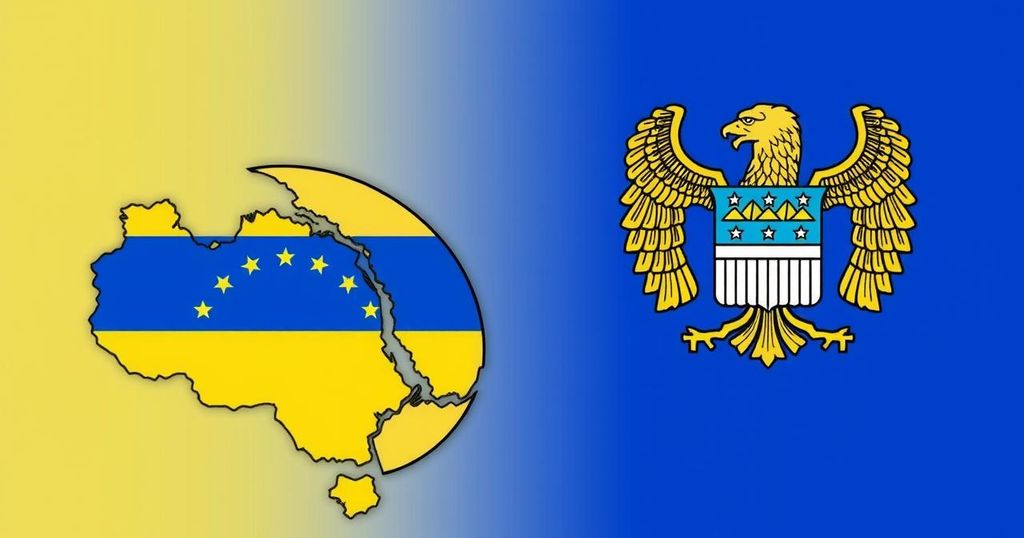Venezuela Recalls Ambassador to Brazil Following BRICS Veto

Venezuela has recalled its ambassador to Brazil following Brazil’s veto of its application to join BRICS, escalating diplomatic tensions amid concerns over election legitimacy. The Venezuelan foreign ministry condemned actions by Brazilian diplomats, as relations between Maduro’s government and Brazil’s growing critical stance worsen, reflecting shifting alliances in Latin America.
On October 30, 2024, Venezuela’s foreign ministry announced the immediate recall of its ambassador to Brazil, Manuel Vadell, for consultations, following Brazil’s recent decision to veto Venezuela’s application to join the BRICS group of emerging economies. This action has ignited tensions between the two nations, particularly as Venezuelan President Nicolas Maduro had perceived Brazil under leftist President Luiz Inacio Lula da Silva as a strategic ally. The Venezuelan foreign ministry attributed the veto to what it described as the “irrational behavior of Brazilian diplomats,” who reportedly defied the consensus of the other BRICS members by implementing a blocking policy against Venezuela’s membership bid. The ministry’s statement did not directly criticize President Lula, who was absent from the BRICS summit in Russia due to a head injury. Instead, the focus remained on the actions of the Brazilian diplomatic corps. Relations between Venezuela and other Latin American countries have become increasingly strained, especially after the disputed July 18 elections in Venezuela. While the electoral authority claimed President Maduro was the winner, detailed results were not disclosed, leading the opposition and some neighboring countries, including Brazil, to remain skeptical. Brazil has yet to recognize Maduro’s electoral victory, demanding transparency and detailed results first. Notably, several countries in the region, like Argentina and Peru, have sided with the opposition’s assertions of victory. The Venezuelan government also condemned comments made by Celso Amorim, a former Brazilian foreign minister and advisor to President Lula. Amorim had suggested that Brazil’s veto was due to a perceived breach of trust by Caracas in failing to conduct transparent elections. In response to these developments, Jorge Rodriguez, the president of the Venezuelan parliament, has called for Amorim to be declared persona non grata within the country, reflecting the growing diplomatic rift. Venezuela’s foreign ministry specifically labeled Amorim as a “messenger of North American imperialism,” emphasizing its disdain for foreign interference in national matters. As tensions continue to rise, the ramifications of this diplomatic fallout are likely to affect both nations’ interactions within regional and global forums.
The article discusses the diplomatic tensions between Venezuela and Brazil stemming from Brazil’s veto of Venezuela’s application to join BRICS. It outlines the context of strained relations following disputed elections in Venezuela, the differing perceptions of political legitimacy, and historical alliances between the countries. The background highlights Brazil’s hesitation to recognize Maduro’s government, reflecting broader regional dynamics and the implications of international relations on energy politics and economic alliances. Moreover, it touches on the historical context of past close alliances in the region, particularly between Hugo Chavez and Luiz Inacio Lula da Silva, but indicates a shift in Lula’s stance towards the Maduro administration and its implications for diplomatic relations.
In conclusion, the recall of Venezuela’s ambassador to Brazil signifies escalating tension between the two nations, precipitated by Brazil’s rejection of Venezuela’s BRICS application and the controversial electoral circumstances in Venezuela. This diplomatic crisis underlines the fragility of alliances in Latin America, especially in the context of ongoing political unrest and accusations of electoral malpractice in Venezuela. The situation remains volatile, with further developments likely as both countries navigate their contentious relationship within the broader geopolitical landscape. The growing hostility may impact not only bilateral relations but also Venezuela’s standing in international forums and alliances, as it grapples with criticism over its domestic policies and governance practices.
Original Source: www.thehindu.com








